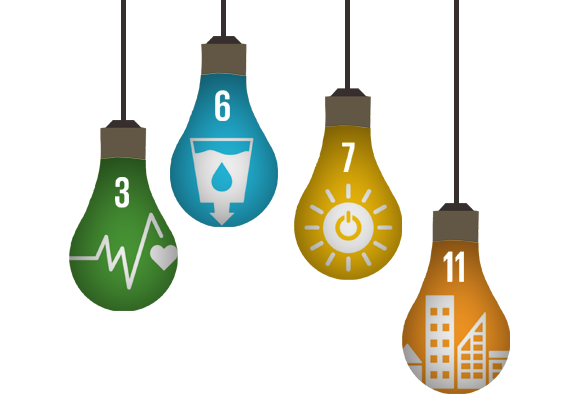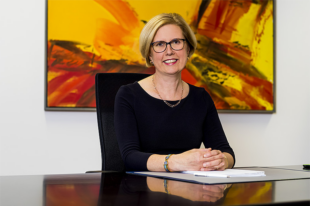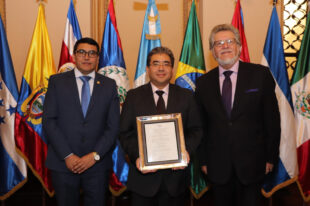Czech Republic SAO Supports SDG Audits

The Supreme Audit Office of the Czech Republic (Czech SAO) has maintained a long-term focus on the environment and its importance for sustainability. In this endeavor, the Czech SAO is an active member of the Working Group on Environmental Auditing (WGEA) for both the International Organization of Supreme Audit Institutions (INTOSAI) and the European Organization of Supreme Audit Institutions (EUROSAI).
Under the umbrella of the INTOSAI WGEA, the Czech SAO has already completed two successful environmental auditing projects and has recently undertaken a third. Additionally, the Czech SAO embraces opportunities to play a key role in international coordinated audits and participates in numerous conferences, seminars and workshops to learn more about, and share best practices on, the environment and sustainability.
Auditing Sustainable Energy Project 2010
With proven experience in auditing sustainable energy, the Czech SAO, in 2010, volunteered to lead the coordination and compilation of “Auditing Sustainable Energy—Guidance for Supreme Audit Institutions (Guidance).”
Collaborating with external experts in sustainable energy and cooperating with the Supreme Audit Institutions (SAIs) of Australia, Canada, Estonia, Morocco, Norway, Poland and the United Kingdom, the Czech SAO authored this guidance in an attempt to help SAIs better understand sustainable energy and identify effective audit approaches.
The Guidance followed four basic steps: (1) Understand sustainable energy issues and its influence on society, economy and the environment; (2) Recognize government response to sustainable energy, environmental concerns (e.g., state programs and policies); (3) Choose suitable audit topics; and (4) Design audits reflecting conditions in the respective country and to formulate appropriate audit questions.
Within the Guidance, sustainable energy covered two main fields: energy generation from renewable energy resources and most effective and economic uses of all energy resources.
In addition to applicable, useful information for all audit phases focused on energy, the Guidance also includes several case studies, which illustrate how SAIs can add value in the sustainable energy arena.
Energy Savings Project 2016
Capitalizing on its experience gained from researching, coordinating and composing the Guidance, the Czech SAO led an “Energy Savings” project which spanned 2014-2016. The project goal was to uncover current energy issues the Czech Republic had in common with other nations.
A study concentrating on energy savings topics and relevant SAI audit work was developed primarily in cooperation with the SAIs of China, the Netherlands, Norway, Slovakia, the United Kingdom and the United States.
The intent behind this study was to highlight the importance of energy savings as a potential area to be audited by SAIs, as well as provide more information regarding energy savings by focusing on audit examples, specific case studies and SAI best practices.
For the project, energy savings was defined as the quantity of energy saved by adopting particular measures, and saved energy was determined by measuring (or estimating) consumption before and after one or more measures were implemented.
From the auditing perspective, it was also necessary to understand potential areas of energy efficiency in phases—generation, supplies, consumption. The role of audit institutions, and auditors themselves, is to evaluate impacts stemming from government policies or measures employed to promote energy savings or energy efficiency throughout each phase.
To obtain a better understanding on energy efficiency and state policies in individual countries, the Czech SAO surveyed INTOSAI WGEA’s 77 member SAIs. The survey focused on:
- Tools used to support or increase energy savings or energy efficiency;
- Indicators established to measure energy savings and energy efficiency; and
- Whether SAIs performed audits of the aforementioned indicators in the last few years.
Survey results showed that 48 countries use energy saving tools, and 32 INTOSAI WGEA member states had set or defined national energy savings indicators. The survey data also illustrated that only a small number of SAIs (14 INTOSAI WGEA members) have performed dedicated audits on energy efficiency or energy savings in the last five years.
In addition to the survey, studies, materials and data collected from external institutions were also cited during the Energy Savings project to emphasize the continued future importance of wisely conserving and using energy.
According to reports from publicly available sources, including the International Energy Agency (IEA), Africa, China, Europe and the United States will become the most important players regarding energy demand in the near future.
From the SAI perspective, future audit activities concerning energy issues become increasingly important, particularly with the introduction of the Sustainable Development Goals (SDGs)—17 global goals aimed at ending poverty, protecting the planet and ensuring peace and prosperity. Goal 7, “Affordable and Clean Energy,” specifically addresses energy consumption and conservation and stresses the necessity to put forth greater efforts in achieving energy efficiency, which is rapidly becoming the most important source of energy.
While not a source in the true sense of the word, energy efficiency is more of a question on conserving energy. A number of countries are learning that the cheapest, and safest, energy is that which does not have to be generated. This represents a major turning point in the way we think about energy.
Greening Cities–Sustainable Urban Development Project 2019
In 2017-2019, the Czech SAO will be leading an INTOSAI WGEA environmental auditing project concerning “Greening Cities–Sustainable Urban Development.” In this endeavor, the Czech SAO will be working with the SAIs of China, Indonesia, Morocco, the Philippines, the Slovak Republic and the United States.
Currently, more than half of the world’s population lives in urban areas. While in 1950, only 30 percent of the world’s population was urban, by 2050 this share is projected to increase to 66 percent. As the world continues to urbanize, sustainable development challenges will be increasingly concentrated in cities, particularly in the lower- to middle-income countries where the pace of urbanization is fastest.
Integrated policies to improve the lives of both urban and rural dwellers are needed. Many of the world´s cities are now facing serious problems with housing, infrastructure, transportation, security, energy, drinking water, employment, education and health care (World Urbanization Prospects, UN, 2014).
The primary purpose of the Greening Cities—Sustainable Urban Development project is to identify and describe the most critical challenges of urban agglomerations, such as air quality, increased noise, waste management problems, sewage system infrastructure, drinking water quality and systems, and related education and health care issues. The project also aims to share SAI knowledge and experiences and emphasize the importance of sustainable urban development within the INTOSAI WGEA.
This project has significant ties to SDGs, including links to the following global goals:
- Goal 3: “Ensure healthy lives and promote well-being for all at all ages;”
- Goal 6: “Ensure availability and sustainable management of water and sanitation for all;”
- Goal 7: “Ensure access to affordable, reliable, sustainable and modern energy for all;” and
- Goal 11: “Make cities and human settlements inclusive, safe, resilient and sustainable.”
One of the Czech SAO´s visions is the “3C” concept—Communication, Cooperation, Comparison. With ongoing international cooperation and exchanges of experience, SAIs will be better suited to respond to challenges, such as climate change and sustainable society. SAIs play a significant role in fighting off such challenges.
Download an electronic copy of Sustainable Energy and Energy Savings from the Czech SAO website at www.nku.cz.





